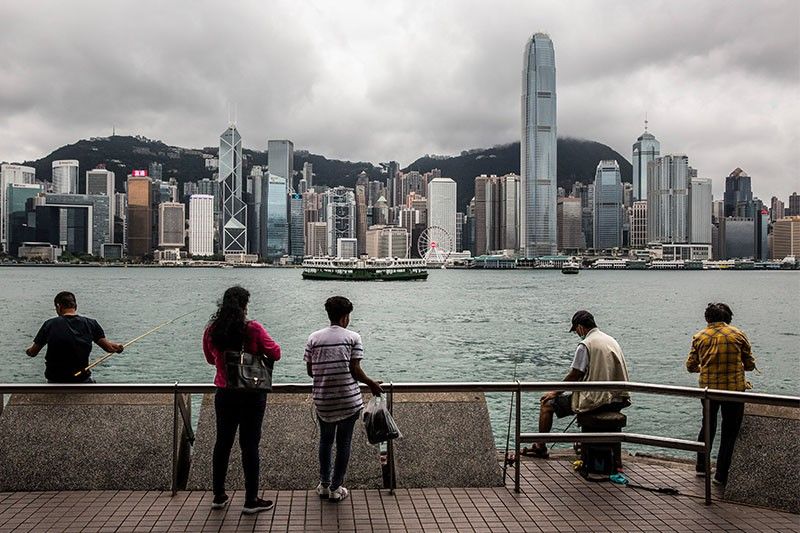What could losing US 'special status' mean for Hong Kong?

HONG KONG, China — Washington's declaration this week that Hong Kong is no longer sufficiently autonomous from China was a historic moment with potentially far-reaching consequences for the finance hub — though much depends on President Donald Trump.
The revocation of special status could radically rearrange the fortunes of a city that has served for decades as the global economic gateway to China.
On Friday, Trump vowed to strip the city of certain trade privileges, saying Beijing's plan to impose a sweeping national security law on the semi-autonomous city was a "tragedy".
But he was light on specifics and the declaration could end up being little more than symbolic.
What is Hong Kong's special status?
In the run-up to Britain returning Hong Kong to China in 1997, a "one country, two systems" deal was forged to allow the city to maintain certain freedoms and autonomy for 50 years.
Those liberties included a free market economy, an independent judiciary, free speech and legislative autonomy.
As a result, many countries, including the United States, brought in laws that allowed them to treat Hong Kong as a separate trade entity to the authoritarian and economically restrictive mainland.
The arrangement allowed Hong Kong to flourish into a world-class financial centre on a par with London and New York.
Reciprocal visa-free travel deals, a dollar-pegged currency, the world's fourth-largest stock exchange as well as business-friendly laws, taxes and legal protections greased the wheels of commerce.
If Washington opts for hardline measures it would risk "all of the financial connectivity that China has to the free market", according to Robert Spalding, a US-China expert at the Hudson Institute.
"Once that goes away, stocks, bonds, financial transactions, SWIFT, all of that is imperilled," he told Bloomberg News.
What happens next?
Trump has certainly indicated he plans to follow up with some concrete measures.
On Friday he instructed officials "to begin the process of eliminating policy that gives Hong Kong different and special treatment".
"This will affect the full range of agreements, from our extradition treaty to our export controls on dual-use technologies and more, with few exceptions," he added.
However, no specific plans were unveiled.
Julian Ku, an expert on international law at Hofstra University, said the president has "lots of flexibility".
"I expect him to take some major steps that would show China he is serious, but not to change every US law that applies to Hong Kong," he told AFP.
How did this come about?
The decision to begin revoking Hong Kong's special status was sparked by growing fears that Beijing is prematurely stamping out freedoms.
Of most recent concern is a plan to ban subversion and acts endangering national security after months of pro-democracy protests last year.
Beijing says the law is needed to curb "terrorism" and "separatism". Opponents fear it will be used to snuff out dissent like on the authoritarian mainland.
Hong Kong's fate has produced rare bipartisan support in Washington with lawmakers last year passing a bill punishing China.
One of the provisions was for the State Department to certify each year whether Hong Kong maintains enough autonomy from China to justify its special status.
On Wednesday the State Department decided it did not.
Is this the end of Hong Kong Inc?
The Trump administration's China policy is unpredictable.
Trump has taken a hard line against Beijing on trade but shown little interest in human rights and spoken warmly of his Chinese counterpart Xi Jinping.
He is also reluctant to jeopardise his trade agreement with China as he seeks re-election in November.
American businesses could be hit hard by moves to economically punish Hong Kong.
According to the Congressional Research Service, nearly 300 US companies have a regional headquarters in the city, while 434 have regional offices.
But attitudes towards China are hardening within the Trump administration, especially after the coronavirus pandemic.
For Beijing, Hong Kong is vital for Chinese companies seeking to access foreign currency, international banks and trading firms.
But it is less pivotal than it used to be — last year 12 percent of China's exports went to or through the city, down from 45 percent in 1992.
Steve Tsang, a China expert at the University of London's SOAS, said US moves were unlikely to make Beijing think twice.
"I believe Xi will double down and retaliate instead," he told AFP.
Capital Economics said short-term economic damage to Hong Kong "would be manageable" if the US rescinded trade privileges.
"But it would accelerate the erosion of Hong Kong's status as an international business centre."
- Latest
- Trending

































